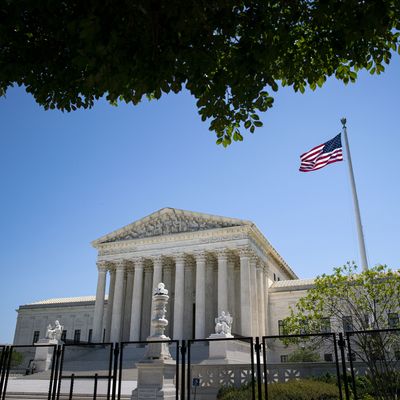
On its way out the door at the end of its fateful 2021–22 term, the U.S. Supreme Court raised alarms by agreeing to hear, when it returns in the fall, Moore v. Harper. The North Carolina redistricting case could wind up all but abolishing the right of state courts to interpret state laws and constitutions in election cases.
The case involves a battle over North Carolina’s congressional and state-legislative redistricting between the Republican-controlled legislature and a court dominated by Democratic appointees. In March, the U.S. Supreme Court turned down by a 6-3 margin the legislature’s request to reinstate its heavily gerrymandered congressional map. The state courts had already struck down and replaced the map on the narrow grounds that it was too close to the 2022 elections to review district lines. Now the review will proceed. And the odds are very high the Court’s conservative majority will vindicate some version of the “independent state legislature theory” the legislators appealed to in denying the right of state courts to interfere with their partisan handiwork. That doctrine holds that language in the U.S. Constitution (in Article I, Section 4) conferring the exclusive right to regulate elections on state legislatures precludes any other branch of state governments from second-guessing them even if state constitutions provide otherwise.
It’s likely the Supreme Court will go in this direction because the last time the Court heard a similar case, in 2015, it issued a 5-4 decision rejecting the “independent state legislature” doctrine. Since then, the author of the majority opinion, Justice Ruth Bader Ginsburg, has been replaced by Justice Amy Coney Barrett. Do the math.
If that indeed happens, the implications for future redistricting cases would be tremendous, particularly since in 2019 the Supreme Court barred federal courts from interfering with partisan gerrymandering. Legislators would be free to rig maps without fear of being contradicted by any judge at any level. And the implications for other crucial election-law questions arising in state courts could be far worse, as election-law expert Rick Hasen noted:
Suppose a state court or agency interprets state rules to allow for the counting of certain ballots, and doing so favors one candidate. If the leaders of the legislature are from the other party, and they say that the interpretation does not follow the views of the legislature, it’s impermissible and the results need to flip. (This is essentially the argument that Chief Justice William Rehnquist and Justices Antonin Scalia and Clarence Thomas accepted in their concurrence in the 2000 Bush v. Gore case, ending the 2000 presidential election and handing it to Bush.)
The “independent state legislature” doctrine was also the basis of an effort by Pennsylvania Republicans in October 2020 to overrule a state judge’s order to allow certain late-arriving (but legally cast) absentee ballots to be counted. It was rejected by the Supreme Court without comment, though the timing of the plea probably affected it (in February 2021, the Court again refused to hear the same complaint, presumably because the number of ballots in question would not have change the results). Going forward, you could see the Supreme Court becoming more hospitable to state-legislative efforts to deny state judicial or executive-branch officials any non-delegated power to interpret or regulate election laws. In the many states where legislators hostile to voting rights are in power, that could be highly problematic.
What the Court — even this radically conservative Court — is not likely to entertain, however, is the kind of rogue interpretations of the independent-state-legislature theory that Trump lawyer John Eastman relied on in his efforts to prevent Joe Biden’s victory from being certified in Congress on January 6, 2021. The state legislatures’ power to determine methods for appointing presidential elections is rooted in a different part of the Constitution (Article II, Section 1) than the more general power to regulate federal elections. But arguably, the Court could interpret both powers as similarly unconditional. That doesn’t mean, however, that Eastman’s wild scheme of state legislatures “revoking” properly appointed electors after the vice-president or Congress “sent the election back to the states” has any real foundation. While the Supreme Court is likely to give maximum latitude to state-legislative-election rules that don’t violate federal constitutional principles before an election (for example, it’s clear that legislatures, if they dared, could prospectively choose to junk the popular election of presidential electors and appoint them directly), this business of overturning election results long after voters have voted remains beyond the pale.
That may be cold comfort to those deploring the steadily shrinking number of restraints on recklessly partisan state legislatures for elections of national significance.
More on the Supreme Court
- The Supreme Court Seems Poised to Rule Against Trans Minors
- Making Sense of Joe Biden’s Supreme Court Reform Plan
- Did the Supreme Court Kill Every Case Against Trump?






























